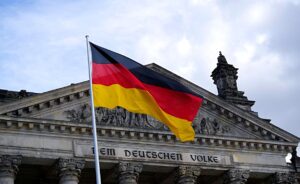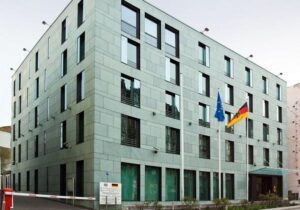
Germany has a complex and multi-level taxation system that covers both legal entities and individual entrepreneurs (IEs). Let us consider the main taxes applicable to these categories of taxpayers.
Taxes for legal entities
1. Corporate income tax (Körperschaftsteuer):
2. Trade tax (Gewerbesteuer):
3. Value added tax (Mehrwertsteuer, MwSt):
Taxes for individual entrepreneurs
1. Income tax (Einkommensteuer):
2. Trade tax (Gewerbesteuer):
3. Value added tax (MwSt):
Other taxes and fees
1. Solidarity tax (Solidaritätszuschlag):
2. Church tax (Kirchensteuer):
3. Property tax (Grundsteuer):
The German tax system is characterized by progressiveness and diversity of taxes, which requires careful planning and accounting when doing business. It is recommended to consult with professional tax advisors to ensure compliance with current legal requirements and optimize the tax burden.

The German and EU governments have financed the construction of six hospitals in Ukraine under the EU4ResilientRegions project, a Special Support Program for Ukraine co-financed by the European Union and the German government.
According to a press release from GIZ Ukraine, which is the general contractor for the projects funded by the German and EU governments, the clinics are located in Lviv, Dnipro, Mykolaiv, Sumy, Zaporizhzhia, and Chernihiv regions.
The first clinic, located in Lviv, started operating in September. By the end of the year, GIZ Ukraine will open five more.
The clinics will be opened on the basis of modular structures, which reduced the project implementation time to eight months.
The hospitals are equipped with modern medical and laboratory equipment, including functional diagnostics (ECG, EEG, ultrasound, etc.), laboratory tests, general practitioner’s office, ENT, ophthalmologist, gynecologist, surgeon, manipulation and consultation rooms, and physiotherapy.
The hospitals are equipped with autonomous 70 kW solar stations designed to ensure the uninterrupted operation of all available medical equipment in the modules (excluding heating needs), as well as 160 kW diesel generators with fuel reserve.
The first of the six facilities to be put into operation in September 2023 was the modular diagnostic center at St. Luke’s Hospital of the First Territorial Medical Association of Lviv. A Philips Ingenia Ambition S magnetic resonance imaging scanner was purchased for the center. Some of the equipment was placed in a modular structure, and some was installed in the existing hospital premises.
The Deutsche Gesellschaft für Internationale Zusammenarbeit (GIZ) GmbH supports the German government in achieving its goals in the field of international cooperation for sustainable development. Priority areas of cooperation between Germany and Ukraine include good governance, energy efficiency and climate, and sustainable economic development. Special attention is also paid to supporting Ukrainian communities that have hosted internally displaced persons.

German Chancellor Olaf Scholz spoke in favor of strengthening control over illegal migration and promised possible additional measures, the German edition of Welt reported on Saturday, September 23.
Many people are coming to Europe and Germany and their numbers have “increased dramatically,” Scholz said at a Social Democratic Party rally in Nuremberg, Welt reported.
In connection with the situation at the borders, Scholz called for clarification of possible irregularities in the issuance of visas in neighboring Poland. “I don’t want Poland to just wave us off and then discuss our asylum policy,” the FRG chancellor emphasized.
According to him, whoever comes to Poland should register there and go through the asylum procedure, “not get visas that were somehow handed out for money.” He suggested discussing the issue with the Polish government.
At the same time, Scholz added, depending on the current situation, “additional measures may have to be taken at the borders.”

The German government will transfer more than 700 generators to Ukraine to alleviate the energy crisis in the country, 41 of which will be given to food producers, in particular to support the production of bread, milk, livestock products and provide electricity to food storage warehouses.
According to a press release from the UN Food and Agriculture Organization (FAO), which is involved in the distribution and delivery of generators in Ukraine, seven bakeries across the country have already received German generators rated 450-550 kW. This will be a timely and tangible support to restore critical food value chains and provide people with life-saving food.
The press release specifies that the day before LLC “Odessa bread-baking plant № 4” (Odessa) received one of the German generators, provided by the German Federal Agency for Technical Relief (THW) with the financial support of the German Foreign Office. Distribution of generators was made by FAO and Ministry of Agrarian Policy and Food of Ukraine.
The company is located in Odessa, where the Russian military aggression at the beginning of 2023 created the most difficult situation with power supply in Ukraine. The enterprise faces constant problems in providing basic activities, as both scheduled and unscheduled power outages disrupt the technological process of baking bread, which also leads to significant financial losses.
“The company is completely dependent on an uninterrupted supply of electricity. We are pleased that thanks to the transfer of this generator we can support Ukrainians and ensure sustainable production of essential products – bread,” the FAO quoted Frank Müller, agricultural attaché of the German Embassy in Ukraine.
According to FAO, Odessa bakery is the largest producer of bakery products in the south of Ukraine and provides bread to more than 58% of the population of the Odessa region. The company employs 910 employees, producing over 100 tons of products daily. The plant’s products are sold in the Odessa, Mykolaiv and Kherson regions, as well as in Kherson, where no other bakery is operating.
“We sincerely thank the FAO and the Ministry of Agrarian Policy for their assistance in providing our enterprise with a generator from the German government. This help is critically needed for our production. Now in Odessa the electricity is provided for two hours a day, so without this generator we would not be able to fulfill our tasks of bread production, to supply sufficient quantity of products to budget organizations of the city and region: schools, kindergartens, hospitals and sanatoriums”, – the FAO quotes the director of the plant Vitaliy Dobrovolskiy.
As it was reported, Germany on January 10 delivered the first 10 high-efficiency electric generators (capacity from 450 kW) to the warehouse in Ukraine, from where they are distributed among the food producers working in the regions suffered from the Russian invasion and also in the recently de-occupied territories.
In total, the German agency planned to transfer more than 700 generators to support the Ukrainian energy system. Of these, in January it planned to supply at least 25 generators to producers of foodstuffs such as bread, milk, livestock products, electricity for food storage facilities, etc.

The German Embassy in Ukraine has resumed work in Kyiv.
“We are back! Yesterday, the German Embassy resumed its work in Kyiv. Foreign Minister Annalena Burbock raised the German flag in front of the Embassy building,” the Embassy said on Twitter on Wednesday.

The German Embassy will resume work in Kyiv, German Foreign Minister Annalena Berbock has said.
“Today we are also here, reopening our German embassy in Kyiv. At first it will be a limited activity. I am very glad that I am here with the Ambassador, Anka Feldhusen. She is accompanying me and she will continue to work in your free city” , Burbock said at a press conference with Ukrainian Foreign Minister Dmytro Kuleba in Kyiv on Tuesday.